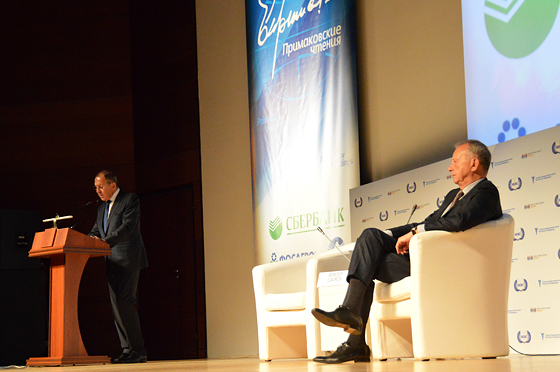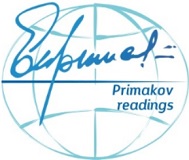
The second day of Primakov Readings was opened by speech of the Minister of Foreign Affairs of the Russian Federation, S.V. Lavrov, who touched upon the aggravation of international contradictions and the narrowing of space for constructive cooperation between countries, and consequently the risks of uncontrolled escalation.
Mr Dynkin,
Colleagues and friends,
Ladies and gentlemen,
I am grateful for a new opportunity to speak at the international forum named after Academician Evgeny Primakov, an outstanding Russian statesman, academic and public figure. It is indeed a great honour for me. I consider Mr Primakov, with whom I worked at the Foreign Ministry in the latter half of the 1990s, my senior comrade and teacher, as probably do the majority of those who crossed paths with him at one point.
Holding this representative conference under the aegis of one of Russia’s leading academic institutes – National Research Institute of World Economy and International Relations (IMEMO) that also bears Primakov’s name – has become a good tradition. The Primakov Readings have earned a reputation as a venue for serious dialogue of authoritative specialists on the most pressing issues of international politics and the global economy.
Today, there is no lack of buzzwords used by politicians, experts and scientists to capture the current moment in international relations. They talk about the crisis of the “liberal world order” and the advent of the post-Western era, “hot peace” and the “new cold war”. The abundance of terms itself shows that there is probably no common understanding of what is happening. It also points to the fairly dynamic and contradictory state of the system of international relations that is hard to characterise, at least at the present stage, with one resounding phrase. The authors of the overarching theme of the current Primakov Readings probably handled the challenge better than others. In its title “Risks of an unstable world order’ they provocatively, and unacademically, combine the words “unstable” and “order”.
Apparently, the world system is being tested for strength. Opposing trends are clashing. First of all, there is globalisation about which we have already talked for a long time. It facilitated a new round of economic and technological development and enhanced mutual dependence and the need for joint approaches in order to cope together with the challenges of the time. The other objective feature of the modern world is the consolidation of polycentric origins and civilisational diversity that is based on national and cultural identity and sovereignty. Today, these two processes are developing into unsound competition, the rivalry between the old and new centres of economic development and related political influence. Importantly, the division lines pass not only between countries but also inside states that claim to be the most successful. The rights of citizens to their own historical identity are being suppressed for the sake of false political correctness. Democracies are falling hostage to minority groups that are rejecting the interests of the majority. The technological revolution is changing the traditional structures of societies. The previous capitalistic model of constantly expanding prosperity is failing to fulfill its promises.
The scale of constructive international cooperation is being reduced against the backdrop of these deepening divides. Unilateral actions that destroy universally recognised rules are becoming a habit and are devaluating collective agreements. As President Vladimir Putin said at the 2018 SPIEF, “playing without rules is becoming the rule.” Force is being instrumentalised in different ways, including the economic and information dimensions. We are witnessing not just the threat of using force (which incidentally is banned by the UN Charter) but the direct and totally unjustified use of force for the sake of momentary, opportunistic interests under blatantly far-fetched and ridiculous pretexts. There has been no end to the practice of outside interference in the affairs of independent states, calls to replace legitimate governments and attempts to influence domestic processes in other states. Traditions of interstate relations, the culture of diplomatic dialogue and the search for compromise are being replaced with the desire to crush one’s opponent and prove one’s supremacy by exerting brazen pressure on “friends and foes.”
When trust is undermined and established norms and rules are discarded, then the risks of uncontrolled escalation increase. And modern technologies reduce the psychological threshold for the use of weapons of mass destruction. War is portrayed as a computer game, as a video on a computer screen. There is a nascent illusion that the force scenario can be retained under local “kinetic action.” Strategies are being adopted to radically increase the role of nuclear weapons; nuclear weapons complexes are being improved, and plans are being made for space and cyberspace. All this can have fatal consequences for the whole planet. Recall the apocalyptic predictions of the 1980s about “nuclear winter.” Fortunately, it did not come. However, the “Arab spring” came, which also exacerbated the problem of WMDs through a series of tragic events. I mean the US withdrawal from the JCPOA on the Iran nuclear programme with a view to pursuing total confrontation with Tehran, as well as many staged incidents involving the alleged use of chemical weapons by the Government of Syria in keeping with the West’s line of regime change in Damascus.
It is regrettable that the unconcealed exploitation of the UN for the sake of achieving narrow geopolitical goals just artificially exacerbates the already critical situation in the field of WMD proliferation and strategic stability.
In this day and age we should be well past comparing the size of red buttons, again testing the limits of each other's determination, bringing the world closer to a dangerous point.
It is obvious that major powers possessing arsenals of nuclear weapons and means of their delivery bear a special responsibility for maintaining global strategic stability. That is why President of Russia Vladimir Putin in his Address to the Federal Assembly once again urged our partners to sit down at the negotiating table and to reflect together on an updated and forward-looking system of international security and sustainable development of civilization.
We are ready for honest and mutually respectful work with all those who sincerely believe not only in the balance of power, but in coordinated multilateral policy based on common interests and international law, a common peaceful future, and development and prosperity for all mankind. It is these approaches that will allow for the fullest realisation of the sovereign priorities of all countries and peoples participating in such cooperation, without departing from their essence.
Attempts to artificially exclude, brazenly circumvent or push someone to the periphery of the process, and resolve all issues in a narrow group of states, are obviously unproductive, and in the long run, they are self-defeating. The history of world politics has a lot of such examples. One of the most instructive is connected with the war of 1853-1856, which, as we know, marked the final collapse of the so-called Vienna system in Europe. The Russian Empire then lost in the Crimean campaign and was pushed back to the margins of European politics, as it seemed to the winners. These negative outcomes for our country were overcome quite quickly, mainly thanks to Chancellor Alexander Gorchakov. But the European balance was seriously disrupted without Russia, which in many ways marked the beginning of destructive trends on the continent that led to the First World War.
Looking at the past, we must not lose sight of the future. Experts in strategic forecasting who are present in this room today will agree with me that for all the technological advances, for all the improvement of analytical methods, we have not yet found a crystal ball that would allow us to see exactly what awaits us in the future. And honestly, it is a good thing. The future is being built now. We form it with our expectations, our plans, ideas, and, most importantly, our daily efforts to make them a reality.
We do not have other prescriptions for how to achieve long-term, sustainable solutions to the most acute contemporary international crises, apart from painstaking work based on multilateral approaches and international law, and involving all interested parties, especially parties to a conflict. Whether it is the nuclear issue on the Korean peninsula or the JCPOA, the internal conflict in Ukraine or the war on terrorism in Syria, we are again and again convinced that ultimatums and the pressure of force imposed from outside, including through coercion, are unacceptable and doomed to failure. Attempts to wildly raise the stakes, like westerns and television series about star wars, are also doomed to failure. Perhaps conducting your affairs like this works in business, but in modern international relations, escalation for the sake of de-escalation generates very serious risks.
It is extremely difficult to search for compromises and mutually acceptable solutions, to form a common understanding, and to cultivate green shoots of trust, especially where the land is smashed with shells and drenched in human blood. Success is by no means guaranteed. But there is no other way if we really want to achieve lasting settlement of conflicts and a just democratic world order.
To be confident and independent in today’s complicated, contradictory and rapidly changing world, one must be not only firm and strong but also open to cooperation with others, to anything new that can help to cope successfully with modern challenges. Even the most advanced countries cannot do that acting on their own. Russian foreign policy priorities, alongside ensuring national sovereignty, security and development, include facilitating the steady, sustainable progress of the country for the benefit of raising the living standards of the population. We are addressing this task by establishing pragmatic and mutually beneficial cooperation, economic integration with our allies and partners by aligning large-scale innovative projects, creating broad cooperation spaces, modern infrastructure, digital communications and transport corridors.
Such joint work is based on a shared vision of international processes, principles of interstate communication and world community organisation – on a firm legal foundation, in the interests of all its members, with respect for their sovereignty and key national concerns. These approaches are shared by our Eurasian allies, members of the CSTO, EAEU, CIS, members of such new formats as the SCO and BRICS.
A special example of that is the comprehensive strategic partnership of Russia and China, as well as the Russian-Indian strategic partnership, and cooperation with ASEAN nations. Russia’s relations with Japan and South Korea have also intensified considerably lately. This fits in well with the concept of “Russia’s pivot to the east” cherished by political scientists, even though it is natural for our country, with its vast expanses and unique geopolitical position, to be involved in the development of one the world’s most dynamic regions.
It was Yevgeny Primakov who first suggested the concept of multipolarity. He saw the first seed of it in building up the RIC triangle, which would allow to create an objective, not confrontational, counterbalance to western domination. And today, after RIC gave birth to BRICS, and when “BRICS plus” counterbalances the G7 countries in the G20 and encourages the adoption of generally acceptable approaches to the global economy, finances, and, potentially, to global politics, this monumental legacy of Primakov’s thought is now fully revealing itself.
Russia remains open to mutually beneficial cooperation with everyone, including our European and American partners. This was discussed at the recent St Petersburg International Economic Forum. Experience shows that we have many common interests both in the economy and in global politics. The main thing is to come to agreement in an honest way, based on mutual respect and equity.

No comments